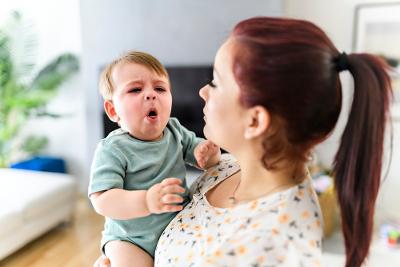Protect your family against whooping cough as cases rise
A worrying rise in cases of whooping cough has prompted renewed encouragement from local public health leaders to vaccinate infants and those who are pregnant.

Article date: 4 June 2024
Whooping cough (also known as pertussis) is a bacterial infection that affects the respiratory system - lungs and breathing tubes.
It can first appear as a cold, but about one week after illness starts, coughing bouts can appear that may last for a few minutes. Young babies may also make a distinctive 'whoop' sound or have difficulty breathing after a bout of coughing. The cough can be particularly worse at night.
Whooping cough has a long infectious period so it's important to stay home until 48 hours after starting antibiotics or three weeks after symptoms start, and practice good home and personal hygiene, cleaning surfaces, hand washing and catching coughs and sneezes.
Vaccination remains the best defence against whooping cough and is part of the routine vaccination schedule for:
- Babies at 8, 12 and 16 weeks
- Children aged 3 years 4 months
Speak to your GP if children under 10 years may have missed one of their routine whooping cough vaccinations.
The vaccine should be given to pregnant women between 16 and 32 weeks of pregnancy onwards to reduce the chance of young babies developing whooping cough by up to 91%. Speak to your midwife or GP if this has not been offered to you.
It is important to get help if:
- your baby is under 6 months old and has symptoms of whooping cough
- you or your child have a very bad cough that is getting worse
- you've been in contact with someone with whooping cough and you're pregnant
- you or your child has been in contact with someone with whooping cough and have a weakened immune system
Whooping cough can spread very easily, so it's best to call the GP before you go in. They might suggest a phone consultation. You can also call NHS 111 for advice.
Ruth du Plessis, St Helens Borough Council's Director of Public Health, said: "While it can be a milder illness in older children and adults, young infants under three months are at highest risk of severe complications and death from whooping cough.
"Unfortunately, there has been a decline in uptake of the whopping cough vaccine for pregnant women and as part of the infant programme over the last couple of years. As cases continue to rise it is vital that families protect themselves by receiving the vaccine.
"Please check that you and your child are up to date with vaccinations and if you are concerned speak with your GP or other healthcare professionals such as midwives or health visitors for advice."
If your child gets whooping cough find NHS advice at https://www.nhs.uk/conditions/whooping-cough/ or ring your GP surgery.
If you are worried about your child, for example if they have difficulty breathing, their lips, tongue or face suddenly turn blue or grey, or they experience chest pain or seizures, call 999 or go to A&E.




